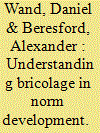|
|
|
Sort Order |
|
|
|
Items / Page
|
|
|
|
|
|
|
| Srl | Item |
| 1 |
ID:
098507


|
|
|
|
|
| Publication |
2009.
|
| Summary/Abstract |
The article examines the Tripartite Alliance in South Africa, drawing on in-depth interviews with members of the National Union of Mineworkers employed by Eskom, South Africa's electricity parastatal. The article challenges the widespread argument that the alliance is heading for an inevitable break-up by interrogating the resilience of workers' support for the ANC. It is argued that workers continue to identify a broad range of aspirations with the party and that the ANC thus remains the primary figurehead of political and social change in these workers' political imaginations. Exploring the attitudes of Eskom workers towards the ANC's presidential succession battle, it is shown that workers continue to hold the ANC as an organization to be sacrosanct: the failures of the ANC government were considered to result from the failure of individual leaders to meet their expectations of representation, mediation, and accountability within the post-apartheid democratic era, rather than any irredeemable ideological shortcoming of the ANC itself.
|
|
|
|
|
|
|
|
|
|
|
|
|
|
|
|
| 2 |
ID:
144246


|
|
|
|
|
| Summary/Abstract |
This article identifies the long-term political factors that contributed to the Ebola crisis in Sierra Leone, factors which are largely overlooked by the emerging international focus on building resilient health systems. We argue that the country exhibits critical symptoms of the recurrent crises of a gatekeeper state, including acute external dependency, patron–client politics, endemic corruption and weak state capacity. A coterie of actors, both internal and external to Sierra Leone, has severely compromised the health system. This left certain sections of the population acutely at risk from Ebola and highlights the need for political solutions to build stronger, inclusive health systems.
|
|
|
|
|
|
|
|
|
|
|
|
|
|
|
|
| 3 |
ID:
175538


|
|
|
|
|
| Summary/Abstract |
Within international relations the normative agency of African actors is often downplayed or derided. This article develops the concept of bricolage to offer a novel understanding of norm development and contestation in international relations, including the role African actors play in this. We contend that a norm's core hypothesis can be thought of as the nucleus of a norm. In the case of complex international norms, if this core hypothesis is sufficiently vague and malleable, the norm will continue to attract a range of actors who may claim to share a commitment to enacting the core hypothesis even if they simultaneously promote a variety of potentially conflicting and contradictory meanings-in-use of the norm when doing so. Each meaning-in-use, we argue, might be thought of as a product of bricolage: a process of combining and adapting both new and second-hand materials, knowledges, values, and practices by an actor to address a problem in hand. Through a detailed study of the contestation of transitional justice between South Africa and the International Criminal Court, we elucidate how bricolage can help to illuminate the normative agency of African actors in shaping transitional justice. Processes of bricolage add complexity and potentially confusion to a norm's development, but bricolage also offers the potential for a creative and dynamic means by which a range of actors can inject pluralism, dexterity, and vitality into debates about a norm's meaning and operationalisation.
|
|
|
|
|
|
|
|
|
|
|
|
|
|
|
|
|
|
|
|
|